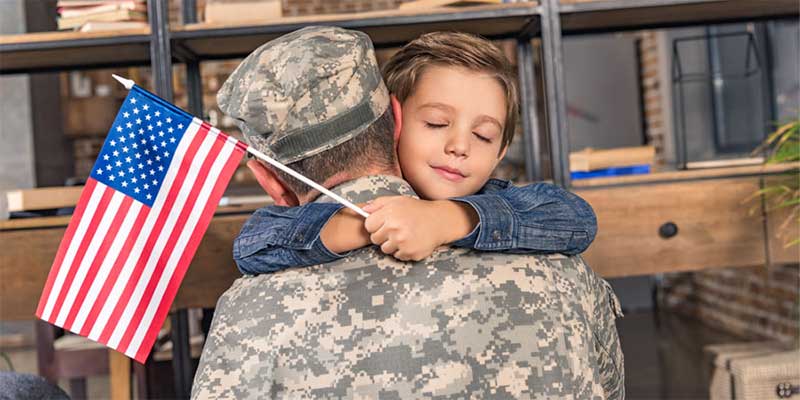Parenting Tips
Teaching Our Children Thankfulness

As we move into November, we want to say how thankful we are for each and every one of our families who inspire us every day to be our best. But Thanksgiving is not the only time we should be expressing our gratitude. “Vitamin G” as it's sometimes called has tremendous benefits to our lives mentally, physically, and socially. We believe it’s never too early to start teaching our children thankfulness.
The Benefits of Gratitude
Just as feeling grateful helps our mental state as adults, it has benefits for our kids, too. Children as young as 5 experience the positive benefits of feeling gratitude. According to studies, thankful children experience less envy than others and are more likely to provide social support to their friends and peers. Thankful children tend to be less materialistic, more satisfied, and happier. In school, grateful children tend to be more engaged in the classroom and with their homework. Higher grades are also a characteristic of thankful children.
The psychology of thankfulness is very powerful. To be grateful is to appreciate the world around you. Not only do grateful people, both kids and adults, have a more positive mental outlook, but they are more likely to engage with life. Thankful people are more likely to exercise, sleep better, and visit the doctor regularly. Thankful people tend to live even longer! It makes sense that practicing gratitude can keep us grounded and present in the moment, instead of being hung up on the “woulda, coulda, shoulda.” Passing this attitude on to our kids early can help them at every stage of development.
Preschoolers vs. Manners
The building blocks of gratitude are learning our “pleases” and “thank yous.” Teaching manners helps break preschoolers of the self-centered attitude that babies and toddlers naturally have. The easiest way to teach these behaviors is through mirroring and parroting. That is, you can use your child’s habit of repeating and mimicking behavior to your advantage. Using the “magic words,” demonstrating sharing, and waiting your turn to speak are all important adjustments to make. Time to brush up on your etiquette! This goes for physical behaviors as well, like eating at the table, greeting and introducing people, and proper posture.
So, how do we put these suggestions into practice? When it comes to please and thank you, you can add these words into your everyday interactions more than you normally would and use them when you’re positively reinforcing good behavior. “Please choose a book for story time tonight.” “Thank you for finishing your vegetables.” “Can you please hold this hair tie while I brush your hair?” “Thank you for being the best kid in the whole world!”
Teaching social graces like how to introduce yourself to people, asking getting-to-know-you questions, and not interrupting will also help children as they begin school and start to make friends. Now, we know most kids are anything but shy! But even the shyest child, with training from their parents about how to talk to new people, will be more prepared when they’re approached at recess or at the park by a potential new friend.
Signs of a Spoiled Child
A lot of times, feeling gratitude comes down to expectations. And if a child expects the world on a platter, then it probably won’t impress them much to get it. We’ve all had to deal with spoiled individuals in our lives, whether as a child or an adult. Some of us might even admit to being a spoiled child growing up and learning better behaviors as we aged into adulthood. If you’re worried that your child or a child in your life might be too spoiled, there are some major warning signs we can pass on to you. A big red flag is how a child behaves when they don’t get their way. Sure, kids have an independent streak and think they know best. But if the child is constantly whining until they get their way or having a major meltdown from hearing the word no, then it might be time to reassess who has the authority in the household. Children don’t know best. And children need to be told no by their parents. Boundaries and expectations are crucial for a child as they are developing. If a child hates the word no, it’s probably because it’s not a word they hear often.
Another barrier to gratitude is being expected to do their share. If a child is not required by parents to do chores, help around the house, take care of siblings or cousins, or even follow simple rules, then they will not get the experience of being thanked, of feeling like a part of a team, or understanding that others need and deserve to feel that way, too. Entitlement is the enemy of gratitude. Kids do want to feel useful and important, even if they can’t articulate the feeling. Eventually, a spoiled child will meet someone who they want to impress, and they may mimic the behaviors of the parent, bending over backward to make the other person feel accommodated. This is a dangerous pattern of behavior for both parties.
Ultimately a spoiled child does not understand empathy. They do not want to compromise, share, accommodate others, or exhibit social awareness because they don’t know how or have never needed to before. How can someone who doesn’t practice empathy be thankful? Children do have the capacity to be empathetic to others and to share and care for the people around them, but it has to be fostered and expected. There also needs to be consequences if these expectations aren’t met. That is why teaching manners to preschoolers is so vital. Even if they don’t have a full grasp of how their behavior affects others at age 3, by age 5 they will have matured enough to begin to understand. Then, the happiness they feel and the positive reinforcement they get from peers will continue to motivate them as they age.
How to Practice Thankfulness
Beyond basic manners, how can you foster the spirit of thankfulness in your house? First, remember that thankfulness shouldn’t be limited to Thanksgiving. We can find things to be thankful for every single day! Expressing our gratitude, voicing what we’re thankful for to others, and celebrating our appreciation as a group are activities you can foster in your home all year long.
As stated previously, being a model for your children also helps them to feel thankful. Express kindness and gratitude to others. Thank the people who do services for you. Thank your pets, if you have them, for being your companions. Thank your children for the good things they do. A lot of positive behavior is expected of our kids, of course. But we don’t want to become entitled to their good behavior, do we? Saying thank you to your child is a huge boost to their self-esteem and lets them know that you see how hard they’re working to be their best.
Another way to practice thankfulness is to help others in need. If you would like to participate in our season of giving, follow this link. If you give your best today, we can make tomorrow better!

